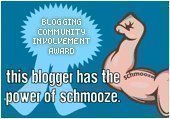
For more Blog Blast for Education entries, please visit April at
It's All About BalanceOne of the things I enjoy most about blogging is how much I learn about other cultures, countries or ideas on a daily basis.
When I think about where I learned the most over the years, they've involved experiences, rather than a classroom:
* Living on my own in Soviet Russia and teaching English there
* Bringing U.S. teens to Soviet Russia for a camp experience
* Using a telescope on our terrace to learn about the patterns of stars and unique astronomical events
* collecting "specimens" by the seashore
* snorkeling
* reading cookbooks and really learning how to cook
* making my way around Paris, Vienna, Florence on my own
* biking through six countries of Europe and only speaking the language (sort of) in three of them
I also had some great "in school" experiences:
* making a "Senegal Village" in Central Park
* researching, writing and performing a play entailing the U.S. Civil Rights movement
* learning to play the violin as an entire class of third graders
* writing, taking to the streets, and eventually sending, petitions about ecology projects for New York State
* participating in a mock trial about similar ecological issues
* creating a 17-minute-long movie as a fifth grader, which we wrote the script for, acted in, directed, and did full editing
* an "Arts and Ideas" course where we read a specific author and studied an accompanying artist, then wrote stories/created art in the style of the writer/artist as well as wrote essays/copied an art piece
* creating the sets for an opera production and working on this in conjunction with artists from The Metropolitan Opera
* participating in a model U.N. session at the U.N. complex itself, alongside students from all over the world
So, yeah, I've been blessed, both educationally and experientially. I've had very, very rich experiences, partly to do with growing up in NYC, partly to do with having a set of parents who pushed me to try new things and who made travel a part of our existence no matter what our other financial obligations were, and partly because I liked a good challenge.
Another, maybe more important reason, though, was that I grew up in the 60s/70s and I went to alternative schools.
No, these aren't the types of "alternative schools" that are last-ditch stops for kids who "can't make it" in any other setting. These are the types of schools that were influenced by Summerhill, Dewey and Outward Bound. These were schools that were going to create competent citizens rather than academes.
And the darned thing, is that despite the fact that I took French, Spanish, Art History, two English classes and two art classes my senior year, I didn't suffer academically from my lack of math and science.
I went on to several excellent institutions of higher learning.
We are in a "back to basics" movement right now, exemplified by "No Child Left Behind". As teachers, we are encouraged to "teach to the tests". Our schools are being graded - more and more academic requirements are being shoved at our high school students and everyone is expected to rack up huge amounts of debt by going to college. And to get into said colleges, we are all expected to have the same, carbon copy education.
This allows for no sense of the individual, no pursuit of interests, and often little passion for learning.
In most other industrialized nations, students begin to specialize by their later high school years. It's accepted that students will lean towards either the humanities, math/sciences, the arts, or vocational training. Yes, vocational training can be a huge bugaboo when it becomes a "slot" to push various classes or races or minorities, but it doesn't have to be set up that way.
What happened to dignity for all of those who CHOOSE hands-on fields? Why should someone who loves carpentry and wants to make things and make them beautifully, fall into college debt? What is this supposed to prove?
What happened to schools without walls? Alternative ed. programs, experiential learning centers, magnet schools?
We are supposed to be a society that prides itself on individualism. In the U.S. we have a truly odd educational system - we don't have national exams, we don't subsidize our students' university educations, we don't really have much decent vocational education, we don't allow our older students to specialize (these are features which are part of virtually all other industrialized nations' educational systems).
Through our system of local school districts, we have the opportunity to think way outside the box. Why, then, are we not taking advantage of this, but instead clinging to an increasingly cardboard cut-out dumbing down?
Not everyone needs trigonometry. Not everyone needs to be able to argue the finer points of Shakespeare or Hemingway.
Everyone needs guidance to find their best calling. Everyone needs experiences to learn what will make them happiest and most competent in life.
We need to go back to more choices.







































